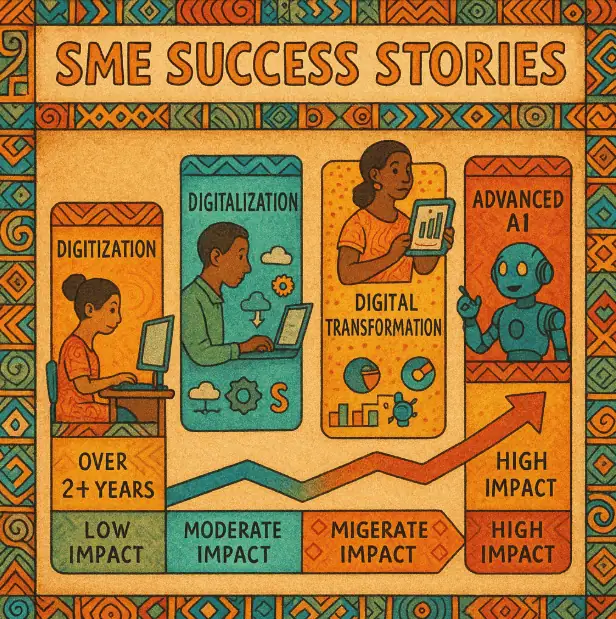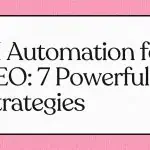SME success stories prove that big dreams can start small. In 2004, Luvuyo Rani sold computers from his car trunk. Today, Silulo Ulutho Technologies runs 46 stores, 21 franchises, and employs 220 people—an SME success story driven by digital transformation. Across the globe, SME success stories like this show how strategic digital adoption unlocks growth and competitive edge. As AI-driven searches rise to 65% of all queries and zero-click results reshape the market, thriving SME success stories come from those who adapt fast and innovate smarter.
As AI-driven searches now account for nearly 65% of all queries and zero-click searches continue to reshape the digital industry, successful SMEs are adapting their strategies to thrive in this new environment.
SME Success Stories Revolutionary AI-Powered Transformations
The Law Firm That Outperformed Google Ads
SME success stories aren’t limited to retail—Jason Xu’s transformation of Commersion Legal shows how AI automation can redefine entire service industries. Once spending 6–7 hours crafting each SEO-optimized legal article, this SME success story took shape when AI-powered workflows through MindPal cut content creation time by over 80% and boosted quality. The impact is clear: one law firm went from zero website leads to a qualified prospect every two days; another saw organic search outperform Google Ads and cancelled paid campaigns; and a property law SME now owns first-page rankings, driving 30+ qualified leads a month with a 90% conversion rate. This is one of these SME success stories where innovation delivers measurable wins.
Key Strategy: Jason’s success stemmed from creating AI-powered workflows that automated research, content generation, and SEO optimization while maintaining the legal expertise that clients demanded.
The Macaron Empire Built on Smart SEO
SME success stories like Pastreez show how strategic SEO can turn a local business into a national brand. Founded by two French pastry chefs, this SME success story began with a clear goal: dominate local search. Within six months, they reached the #1 spot for “macarons near me,” one of the most competitive local keywords.
The results validate the approach: over one million macarons sold—driven largely by organic traffic—brick-and-mortar expansion within four years, and sustained top-5 Google rankings six years later. Today, 55% of sales come from non-branded organic searches and another 10–15% from branded terms, proving that SEO can deliver lasting impact in SME success stories.
Their method was disciplined: local SEO optimization, consistent high-quality content, and building topical authority in a narrow niche. Pastreez demonstrates that with the right strategy, SME success stories can be built on visibility, relevance, and long-term search dominance.
E-commerce and Digital Commerce Breakthroughs
The Fashion Retailer’s AI Recommendation Revolution
A global fashion brand’s integration of AI-powered recommendation engines showcases the potential of personalized customer experiences. By analyzing browsing history, purchase patterns, and customer preferences, the company delivered tailored product suggestions to each visitor. The implementation yielded impressive results within six months: 30% increase in overall revenue, significantly improved customer engagement rates, and enhanced customer lifetime value. The personalization engine effectively transformed one-time browsers into repeat customers by understanding and anticipating their preferences.
Key Strategy: The retailer succeeded by leveraging customer data intelligently, creating personalized shopping experiences that felt intuitive rather than intrusive.
The Electronics Store’s Dynamic Pricing Success
An online electronics retailer revolutionized their pricing strategy through AI-powered dynamic pricing systems. The technology adjusted prices in real-time based on demand fluctuations, competitor pricing, and inventory levels. This data-driven approach led to record-breaking sales during peak seasons and optimized profit margins throughout the year. The system’s ability to respond instantly to market conditions gave the company a significant competitive advantage over traditional retailers with static pricing models.
Key Strategy: Success came from embracing data-driven decision making and automating pricing strategies to respond instantly to market dynamics.
Manufacturing and Operational Excellence
The Construction Firm’s Digital Project Revolution
A small construction company exemplifies how traditional industries can embrace digital transformation for operational excellence. By implementing cloud-based project management tools, the firm streamlined their entire workflow from initial planning to final delivery. The results were transformative: 30% reduction in project delivery times, significantly improved client satisfaction scores, and reduced overhead costs related to resource allocation and tracking. The digital tools enhanced decision-making processes through real-time data analytics, giving the company a competitive edge in a saturated market.
Key Strategy: The firm succeeded by identifying their biggest operational bottlenecks and implementing targeted digital solutions that addressed specific pain points while improving overall efficiency.
The Manufacturing Company’s Automation Triumph
A medium-sized European manufacturing company faced rising labor costs and production inefficiencies. Their response—investing in robotic process automation (RPA) and IoT-enabled machinery—demonstrates how traditional manufacturers can modernize their operations. The digital transformation delivered measurable results: 25% improvement in production efficiency, 15% reduction in labor costs, and enhanced ability to meet growing demand without compromising quality. The company also achieved better supply chain management, reducing lead times and improving customer satisfaction scores.
Key Strategy: The manufacturer succeeded by focusing on automation technologies that enhanced rather than replaced human capabilities, creating a more efficient and responsive production environment.
Service Industry Digital Innovations
The Marketing Agency’s Content Automation Success
A small marketing agency transformed their content creation processes by adopting AI tools like HubSpot and Hootsuite for social media automation and engagement analysis. This strategic implementation demonstrates how service businesses can scale their offerings without proportionally increasing their workforce. The agency achieved remarkable growth: 30% boost in lead generation through optimized campaigns, significantly improved efficiency allowing focus on strategic rather than tactical work, and enhanced client results through data-driven insights. The automation tools enabled the agency to manage larger client portfolios while maintaining high service quality.
Key Strategy: Success came from automating routine tasks while reserving human creativity and strategic thinking for high-value client activities.
The Restaurant’s Digital Ordering Revolution
A local restaurant’s transformation from phone-only orders to comprehensive digital ordering illustrates how traditional food service businesses can embrace technology. The implementation of an online ordering system revolutionized their customer experience and operational efficiency. The digital transformation yielded impressive results: faster and more accurate order processing, expanded customer base beyond geographical limitations, and improved service quality leading to higher customer satisfaction. The restaurant could now serve more customers simultaneously while reducing order errors and processing time.
Key Strategy: The restaurant succeeded by identifying customer pain points in their ordering process and implementing digital solutions that improved both customer experience and operational efficiency.
African SME Innovation Leadership
Silulo Ulutho Technologies: From Car Trunk to Corporate Empire
SME success stories in Africa are exemplified by Silulo Ulutho Technologies in South Africa. Founded by brothers Luvuyo and Lonwabo Rani, this SME success story started in 2004 with computers sold from the trunk of a car. Despite obstacles such as a shortage of IT-skilled employees, limited access to finance, and inadequate infrastructure, they recognized the transformative potential of technology.
Their approach was deliberate: invest heavily in IT training for employees, develop robust IT infrastructure to ensure operational efficiency, and establish strategic partnerships with IT vendors—all while maintaining a strong focus on customer satisfaction and after-sales service.
The results were measurable and far-reaching: the business expanded from a two-person operation to a workforce of over 220 employees, grew to 46 stores and 21 franchises, and became a significant contributor to South Africa’s IT ecosystem. This SME success story shows how targeted digital transformation strategies can drive remarkable growth and meaningful local economic impact.
Key Strategy: Silulo Ulutho Technologies succeeded by investing heavily in human capital development, building strong partnerships, and maintaining unwavering focus on customer service excellence throughout their digital transformation journey.
SME Success Stories: Overcoming Digital Challenges for Growth
Tackling Common Barriers
SME success stories often start with overcoming budget constraints. Many adopted phased implementation, focusing first on high-impact, low-cost solutions. Typical allocations ranged from 2–5% of annual revenue for B2B and 5–10% for B2C digital marketing, showing that transformation can begin without large upfront investment. Another common hurdle was the zero-click search trend, where 65% of searches now end without a website visit. Leading SMEs responded by optimizing for AI visibility, targeting featured snippets, and strengthening local search presence. Content strategies shifted to answering user questions directly and delivering immediate value, even without a click-through.
Strategic Technology Adoption
In SME success stories, technology adoption was planned rather than reactive. Mobile-first design was prioritized, aligning with the reality that over 60% of web traffic comes from mobile devices. Voice search optimization was also a key step, with 62% of American adults now using voice assistants. Successful SMEs adapted their content for conversational queries and local search terms, positioning themselves to serve this fast-growing user segment.
Measuring Impact and ROI
Measurement was consistent across these SME success stories. Common KPIs included customer acquisition cost reduction, increased customer lifetime value, and improved operational efficiency. Many businesses achieved 20–30% reductions in operational costs and up to 29% revenue growth through AI-driven marketing strategies. Automation was tracked through metrics such as reduced cycle times, lower error rates, improved employee productivity, and higher customer satisfaction. These metrics were monitored continuously, enabling data-driven refinement of digital strategies for sustained success.
Strategic Recommendations for SME Growth
Technology Adoption Framework
Based on these SME success stories, SMEs should adopt a structured approach to digital transformation. The framework begins with identifying core business processes that could benefit from automation or optimization. Successful companies typically started with customer-facing processes like ordering systems or customer service, then expanded to internal operations. The implementation sequence often follows a predictable pattern: basic digitization (3-6 months), process optimization (6-12 months), strategic integration (1-2 years), and advanced transformation including AI adoption (2+ years). This phased approach allows SMEs to build capabilities gradually while maintaining operational stability.
Investment Prioritization
Successful SMEs prioritized investments based on potential impact and resource requirements. High-impact, low-resource initiatives included Google Business Profile optimization, basic SEO implementation, and social media automation. Medium-term investments focused on CRM systems, e-commerce platforms, and content management systems. Advanced investments in AI, predictive analytics, and sophisticated automation tools were typically implemented after establishing foundational digital capabilities. This progressive approach ensured that each investment built upon previous successes while minimizing risk.
Future-Proofing SME Success
Emerging Technology Trends
SME success stories are increasingly influenced by the rise of Generative Engine Optimization (GEO) as AI-powered search engines like ChatGPT and Perplexity gain market share. Early adopters optimizing their content for AI visibility have reported up to 40% improvements in generative engine rankings, securing a competitive edge in a shifting search environment.
The integration of AI across business functions is also accelerating, with 75% of small businesses planning adoption within the next three to five years. Forward-thinking SMEs are already experimenting with AI in customer service, content creation, and operational optimization, positioning themselves to lead as these technologies become mainstream.
Building Sustainable Competitive Advantages
The most inspiring aspect of these success stories is how SMEs leveraged digital transformation to build sustainable competitive advantages. Unlike traditional competitive factors such as location or resources, digital capabilities can be developed and enhanced continuously. SMEs that invest in digital skills, customer data analytics, and process automation create moats that are difficult for competitors to cross. These success stories prove that digital transformation is about strategic thinking, consistent execution, and customer-focused innovation.
As these eight surprising SME success stories demonstrate, the companies that will thrive in the coming decades are those that embrace change, invest in their people, and never stop learning. The transformation journey may seem daunting, but as Silulo Ulutho Technologies, Pastreez, and countless other SMEs have proven, the rewards far outweigh the challenges. Can you afford not to invest in digital transformation?
Sources
1. Digital transformation for SME survival and growth:
OECD Survey Highlights
2. AI adoption among SMEs (39% use AI apps, up from 26% in 2024):
Daijobu.ai Insights
3. Mobile-first design critical (60%+ of global web traffic):
Huddle Creative
4. Voice search optimization (4.2B assistants in use, 8.4B by year-end):
Yaguara Statistics
5. Content marketing ROI (3x more leads, 62% less cost):
Firework Marketing Stats
6. African SMEs and digital transformation growth:
LinkedIn Article
7. Zero-click searches reshaping SEO (60% of US searches in 2024):
Workshop Digital
8. Digital capabilities for SME competitive advantage:
SAGE Journal






